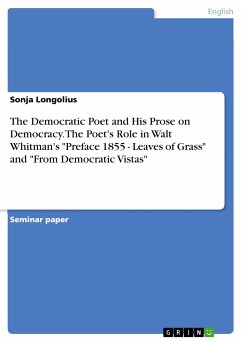Seminar paper from the year 2004 in the subject American Studies - Literature, grade: 2, Free University of Berlin (John-F.-Kennedy Institut), language: English, abstract: When the 52-year-old Walt Whitman published his essay "From Democratic Vistas" in 1871, the end of the Civil War was only six years ago. The wounds of this five-year-war of brother against brother were certainly not healed and the question of re-unification was still un-answered. During the 1860s and 1870s the United States were changing tremendously. Due to the Civil War, the Reconstruction Era and the following Gilded Age, America was turning into a modern, industrialized country where materialism seemed to be the finite answer. Though Whitman fully acknowledged this materialistic development of his country, he nevertheless saw beyond the simple answers of wealth and prosperity. Whitman realized that the United States found themselves at a turning point, which was to decide upon their democratic future. At this point in time, Whitman wrote his essay "From Democratic Vistas" on the outlooks of America's future democracy. According to him, this future lied in a democratic nationality and a spiritual union that could only be achieved through a national literature. The call for a national literature led by the American poet was not something new in Whitman's written work. Already in his "Preface 1855 - Leaves of Grass," published six years before the beginning of the Civil War, he had formulated that America "with veins full of poetical stuff most need[s] poets." Nevertheless, there is a noticeable difference between the general role of the poet in his 1855 preface and the urgent need of national literary figures in times of re-unification that Whitman put forth in his 1871 essay. While Whitman's poet in the 1855 preface obtained the role of an observer of the country and her common people, the poet's role in "From Democratic Vistas" changed into an active builder of democracy. This change of role is due to Whitman's personal experiences during the war. The healing process of re-unification after the war was not simply a materialistic or institutional reunion for him, but rather an act of forming a sense of nationhood within the American people. This was the poet's task. Being no longer an observer from the outside, Whitman's challenged poet was forced to take up an active stand in the nation-building process after the Civil War.
Dieser Download kann aus rechtlichen Gründen nur mit Rechnungsadresse in A, B, BG, CY, CZ, D, DK, EW, E, FIN, F, GR, HR, H, IRL, I, LT, L, LR, M, NL, PL, P, R, S, SLO, SK ausgeliefert werden.









